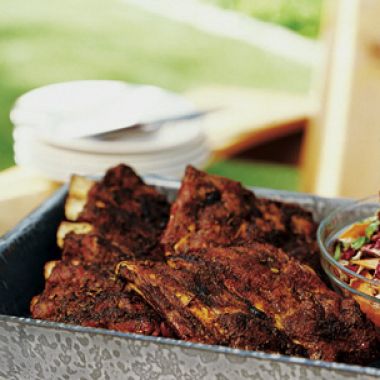Smoking Foods on the Grill

To smoke foods, follow these basic steps: Prepare a fire for indirect-heat grilling as directed in your recipe. If using a charcoal grill, place a drip pan on the center of the fire bed. Soak the wood chips or other flavoring materials in water for 30 minutes, then drain. Add the chips directly to the coals while the food cooks, timing the addition so the flavor of the smoke they generate heightens, but does not dominate, the flavor of what you are cooking. Robust meats, for example, can take longer smoking, while just a few minutes of smoke toward the end of cooking is enough for mild seafood.
If you are grilling large items, such as a whole bird or a roast, which spend a lot of time on the grill, you may need to add additional smoking materials during cooking. Keep some soaked wood chips or other aromatics on hand, then drain and toss them on the coals when needed.
If using a gas grill, do not soak the wood chips. Place them in a smoker box or perforated foil packet, then set it directly over a heat element on the grill to ignite the chips.
Whether you are using a charcoal or a gas grill, close the lid when smoking foods. Heat circulates around the food so it cooks slowly and evenly, as it would in an oven.
Electric smokers are also available, which simplify the process of smoking foods. You add wood chunks, place the food on the racks and turn on the smoker. An adjustable thermostat ensures precise heat control.
Adapted from Williams-Sonoma, Essentials of Grilling, by Denis Kelly, Melanie Barnard, Barbara Grunes & Michael McLaughlin (Oxmoor House, 2003).